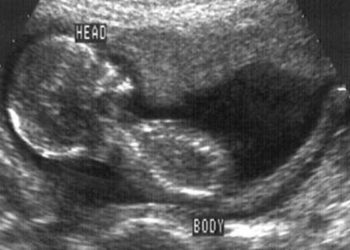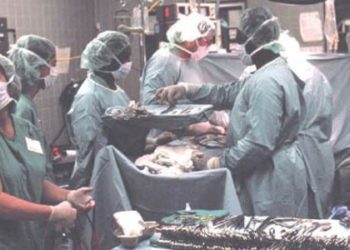No difference in outcomes following pelvic organ prolapse treatments
Image: PD
1. The use of sacrospinous ligament fixation (SSLF) or uterosacral ligament suspension (ULS) for repair of pelvic organ prolapse did not affect outcomes 2 years after surgery.
2. Perioperative behavioral therapy with pelvic floor muscle training (BMPT) did not improve urinary incontinence outcomes at 6 months or pelvic surgery outcomes at 2 years compared to usual care.
Evidence Rating Level: 1 (Excellent)
Study Rundown: Pelvic floor disorders affect men and women; however, they are disproportionately common among women as they age resulting in urinary incontinence and pelvic organ prolapse. This study examined two different surgical procedures for the treatment of pelvic organ prolapse, sacrospinous ligament fixation (SSLF) and uterosacral ligament suspension (ULS), with and without perioperative behavioral therapy with pelvic muscle training (BMPT) to determine whether the outcomes were affected by the type of procedure or the addition of BMPT with either procedure. The study found no significant difference in surgical success, anatomical failures or adverse events at two years after the surgery between SSLF and ULS patients. In addition, BMPT offered perioperatively did not affect urinary symptoms at 6 months with either surgery nor affect prolapse outcomes at 2 years. The major strength of this study was the multicenter approach with various surgeons and a strong randomized design for the study. In addition, the standardized functional outcomes among the centers allowed for broad based analysis. The major weakness of this study was that it was not powered to detect interactions between surgical and behavioral interaction. Furthermore, the study is limited in the applicability towards women who may need mesh for augmented prolapse repairs.
Click to read the study in JAMA
Relevant Reading: Peri-operative physiotherapy improves outcomes for women undergoing incontinence and/or prolapse surgery
In-Depth [multi-center, 2 x 2 factorial, randomized control trial]: This study examined the outcomes between two types of surgery for pelvic organ prolapse: sacrospinous ligament fixation (SSLF) and uterosacral ligament suspension (ULS). Furthermore, it examined whether or not behavioral therapy with pelvic muscle training (BPMT) perioperatively affected the outcome compared to usual treatment. Women were randomized into two surgical treatment groups, SSLF (n = 186) vs. ULS (n = 188) and further into two behavioral treatment groups, BPMT (n = 186) vs usual care (n = 188). At 6 months, no difference was found between the two behavioral groups with the median Urinary Distress Inventory (UDI) being 12.7 (P = 0.61). At 2 years, there was no difference in surgical success (P = 0.75), anatomic failure (P = 0.10) or bothersome vaginal bulge symptoms (P = 0.49). When comparing the behavioral groups at 2 years, there were no differences in anatomic failure (P = 0.15). When looking at interactions between the surgical and behavioral groups, BPMT had a higher odds of having apical decent greater than 1/3 of the total vaginal length compared to the usual treatment (OR 1.8, 95% CI: 1.4 – 10.2).
More from this author: Early onset dementia strongly correlated with alcohol intoxication in men, Perceived futility of treatments in the ICU dependent on key patient factors, Separate panels of microRNAs may aid in early detection of pancreatic cancer, Reduced doses of human papillomavirus vaccine may be effective in preventing condyloma, Long term gastric acid suppression associated with vitamin B12 deficiency
©2012-2014 2minutemedicine.com. All rights reserved. No works may be reproduced without expressed written consent from 2minutemedicine.com. Disclaimer: We present factual information directly from peer reviewed medical journals. No post should be construed as medical advice and is not intended as such by the authors, editors, staff or by 2minutemedicine.com. PLEASE SEE A HEALTHCARE PROVIDER IN YOUR AREA IF YOU SEEK MEDICAL ADVICE OF ANY SORT.






